Prøve GULL - Gratis
A TELESCOPE FOR A GOLDEN AGE
Australian Geographic Magazine
|September-October 2024
After a stellar 50 years as one of the country's major scientific assets, the AAT continues to play a major role in keeping Australian astronomy on the world stage.

BACK IN SEPTEMBER 1969 in a laboratory in north-eastern England, a young, newly minted physics graduate was engaged in a job that no more than a dozen people worldwide would be doing. It was a humble task – fabricating a circular polyethylene air-bag 3.9m in diameter and no more than a couple of centimetres thick. What made the job unique was the purpose of this unwieldy plastic pouch. Once pressurised, it would cushion a 16-tonne disc of an exotic glass-ceramic material known as Cer-Vit while it was ground and polished during many months to form the precisely dished mirror of a giant telescope.
That starstruck youngster was me and this was my first encounter with the Anglo-Australian Telescope – the AAT – on which construction was just beginning in the venerable telescope-building works of Sir Howard Grubb, Parsons & Company at Newcastle upon Tyne, England. I could hardly have guessed that by the 1990s I’d be managing the same telescope’s scientific output as its Astronomer-in-Charge, and that in far-distant 2024 I’d be helping celebrate half a century of ground-breaking AAT discovery as the Australian Government’s Astronomer-at-Large.
 THE GENESIS OF THE AAT goes back much further than 1969. In the late 1950s the new science of radioastronomy was experiencing significant infrastructure investment in both the UK and Australia – think observatories in Jodrell Bank, England, and Parkes, New South Wales. It was Richard Woolley, then at Mount Stromlo Observatory in Canberra and subsequently Britain’s 11th Astronomer Royal, who floated the idea of a large, jointly funded visible-light telescope in the Southern Hemisphere to allow optical astronomers in both countries to keep up with their radio colleagues.
THE GENESIS OF THE AAT goes back much further than 1969. In the late 1950s the new science of radioastronomy was experiencing significant infrastructure investment in both the UK and Australia – think observatories in Jodrell Bank, England, and Parkes, New South Wales. It was Richard Woolley, then at Mount Stromlo Observatory in Canberra and subsequently Britain’s 11th Astronomer Royal, who floated the idea of a large, jointly funded visible-light telescope in the Southern Hemisphere to allow optical astronomers in both countries to keep up with their radio colleagues.Denne historien er fra September-October 2024-utgaven av Australian Geographic Magazine.
Abonner på Magzter GOLD for å få tilgang til tusenvis av kuraterte premiumhistorier og over 9000 magasiner og aviser.
Allerede abonnent? Logg på
FLERE HISTORIER FRA Australian Geographic Magazine

Australian Geographic Magazine
SULAWESI SENSATIONS
There are worlds within worlds and marvels untold waiting to be experienced on Indonesia's remote islands.
9 mins
September-October 2024
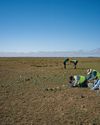
Australian Geographic Magazine
SEARCHING FOR AUSSIE DINOSAURS
Our understanding of where to find ancient life in Australia has been turned on its head by a new appreciation of the country's geology. Now the world is looking to our vast outback as the latest hotspot to locate fossils.
18 mins
September-October 2024

Australian Geographic Magazine
THE HARDEST NIGHT
The first Australian ascent of Mt Everest in 1984 is one of the great feats of mountaineering. Climbed by a small team semi-alpine style, with no bottled oxygen, via the Great (Norton) Couloir, it remains unrepeated 40 years later.
14 mins
September-October 2024
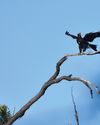
Australian Geographic Magazine
WEDGE-TAILED WONDER
The chance discovery of an eagle nest leads to an extended vigil observing normally hidden behaviours of one of nature's supreme winged marvels.
3 mins
September-October 2024
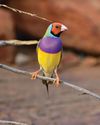
Australian Geographic Magazine
BURDENED BY BEAUTY
Northern Australia's Gouldian finch survives in huge numbers in cages around the world, but its wild population continues to struggle.
4 mins
September-October 2024
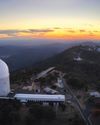
Australian Geographic Magazine
A TELESCOPE FOR A GOLDEN AGE
After a stellar 50 years as one of the country's major scientific assets, the AAT continues to play a major role in keeping Australian astronomy on the world stage.
7 mins
September-October 2024
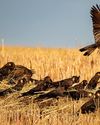
Australian Geographic Magazine
COCKY WHISPERING AT COOMALLO CREEK
This patch of remnant bush on the edge of the West Australian wheatbelt is a place loved by one of Australia's rarest bird species and the man who has studied the site for more than 50 years.
6 mins
September-October 2024

Australian Geographic Magazine
A PIONEERING PAIR
Louisa Atkinson and her mother, Charlotte, were among Australia's earliest authors, and pioneers in women's rights.
9 mins
September-October 2024

Australian Geographic Magazine
THE LONGEST WALK
Lucy Barnard is walking from Argentina to Alaska -the length of the Americas - on an extraordinary journey of endurance and adventure.
6 mins
September-October 2024
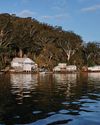
Australian Geographic Magazine
SECLUDED, BUT NOT ALONE
In an era of heightened social isolation, where many of us lead lonely lives, Dangar Island offers the chance to be part of a supportive, connected community.
7 mins
September-October 2024
Listen
Translate
Change font size

